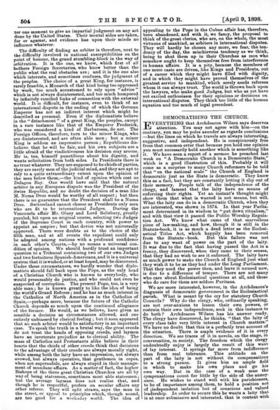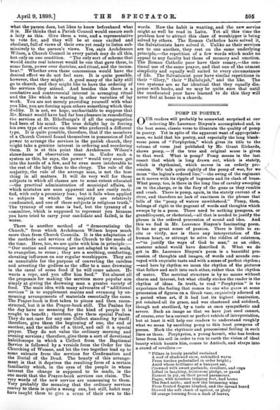DEMOCRATISING THE CHURCH.
EVERYTHING that Archdeacon Wilson says deserves attention. You may not agree with him—on the contrary, you may be poles asunder as regards conclusions —but the lines on which he travels are always interesting, suggestive, and independent. He is conspicuously free from that common error that because you hold one opinion you must necessarily hold another which is something like it. We have seen a report of a sermon he preached last week on "A Democratic Church in a Democratic State," which is a good illustration of this. Probably it will come as a surprise to many Church reformers to be told that "on the national scale" the Church of England is democratic just as the State is democratic. They know this as a fact, but they are constantly letting it slip out of their memory. People talk of the independence of the clergy, and lament that the laity have no means of enforcing their rights. Yet an instant's thought might show them that what is wanted is not means, but will. What the laity can do in a democratic Church, when they are interested, was shown in 1874. In that year Parlia- ment determined in its wisdom to "put down ritualism," and with that view it passed the Public Worship Regula- tion Act. We know what came of that marvellous piece of law-making, and how, though it is still in the Statute-book, it is as much a dead letter as the Ecclesi- astical Titles Act, which happily has been removed from the Statute - book. But this failure was not due to any want of power on the part of the laity. It was due to the fact that having passed the Act in a frenzy, they discovered, when they came to their senses, that they had no wish to see it enforced. The laity have as much power to make the Church of England just what they wish it to be as they had under the Long Parliament. That they used the power then, and leave it unused now, is due to a difference of temper. There are not many who care about Ecclesiastical questions at all, and those who do care for them are seldom Puritans.
We are more interested, however, in the Archdeacon's diagnosis of democratic government in the Ecclesiastical parish. What is meant by the cry for statutory Church Councils ? Why do the clergy, who, ordinarily speaking, are not over-anxious to lessen their own powers, or restrain their own independence, seek in this instance to do both ? Archdeacon Wilson has his answer ready. The clergy have discovered, he thinks, "that the laity of every class take very little interest in Church matters." We have no doubt that this is a perfectly true account of the situation. There is ample evidence of it in every direction. We see traces of it in novels, on the stage, in conversation, in society. The freedom which the clergy undoubtedly enjoy is largely the result of this want of lay interest. It springs far more from indifference than from real tolerance. This attitude on the part of the laity is not without its compensations to a strong parson. It gives him an ample field in which to make his own plans and go his own way. But in the case of a weak man the compensations count for little by the side of the annoy- ance. He wishes to stand well with his parishioners, to be of importance among them, to hold a position not of lindependent isolation but of conscious and valued leadership. In order to secure this he wants a laity that is at once submissive and interested, that is content with what the parson does, but likes to know beforehand what it is. He thinks that a Parish Council would ensure such a laity as this. Give them a vote, and a representative to vote for, and they will be at once excited and obedient, full of views of their own yet ready to listen sub- missively to the parson's views. Yes, says Archdeacon Wilson, a Church Council in every parish may do all this, but only on one condition. " The only sort of scheme that would excite real interest would be one that gave them, in some form, power over doctrine, and ritual, and the incum- bent." Whether even these concessions would have the desired effect we do not feel sure. It is quite possible, however, that they might. A good many of the laity still go to church, and they might like to have the ordering of the services they attend. And besides this there is a combative and controversial interest in arranging ritual and the like which is wanting in other varieties of lay work. You are not merely providing yourself with what you like, you are forcing upon others something which they dislike. It is not, we hope, uncharitable to suppose that Mr. liensit would have had far less pleasure in remodelling the services at St. Ethelburga's if all the congregation had been of his mind. The true delight lay in forcing his own type of service on those who preferred a different pe. It is quite possible, therefore, that if the members of a Church Council found themselves in possession of full power to arrange the services in the parish church, they might take a genuine interest in ordering and reordering them. It is at this point that Archdeacon Wilson's shrewdness of observation comes in. Under such a system as this, he says, the power "would very soon get into the hands of a few, and be even more intolerable to the rest of the laity than to the clergy. The rule of the majority, the rule of the average man, is not the best thing in all matters. It will do very well for those subjects in which all classes are to some extent educated —the practical administration of municipal affairs, in which mistakes are soon apparent and are easily recti- fied, with only a pecuniary loss ; but it fails when applied to subjects in which the majority are relatively uneducated, and one of these subjects is religious truth." The tyranny of one man is bad, but the tyranny of a committee, which is supposed to represent you because you have tried to carry your candidate and failed, is far worse.
There is another method of "democratising the Church," from which Archdeacon Wilson hopes much more than from Church Councils. It is the adaptation of the methods and services of the Church to the needs of the time. Here, too, we are quite with him in principle :— " Our matins and evensong are not adapted to win souls, to evangelise, to rouse ; they are a soothing, comforting, elevating influence on our regular worshippers. They are as unsuitable for the purpose of converting the careless and arresting the godless as the offer to a man drowning in the canal of some food if he will come ashore. He wants a rope, and you offer him food." Yet almost all the proposals for making the services more popular aim simply at giving the drowning man a greater variety of food. The main idea with many advocates of "additional services" is to supplement matins and evensong by un- meaning arrangements of materials essentially the same. The Prayer-book is first taken to pieces and then recon- structed, but it is the Prayer-book still. The Psalms for the day have no meaning for the kind of people it is sought to benefit ; therefore, give them special Psalms. They do not care for any one Collect standing by itself ; therefore, give them the beginning of one, the end of another, and the middle of a third, and call it a special prayer. They do not value the ordinary morning and evening services ; therefore, give them a sort of devotional kaleidoscope in which a Collect from the Baptismal Service is followed by a. versicle from the Order for the Churching of Women, and let the two together lead up to some extracts from the services for Confirmation and the Burial of the Dead. The beauty of this arrange- ment is that it deprives the resulting form of a certain familiarity which, in the eyes of the people in whose interest the change is supposed to be made, is the one merit that the Prayer-book services can claim. The very words of the new service are unmeaning to them. Very probably the meaning that the ordinary services convey to them is quite a wrong one, but still, habit may have taught them to give a sense of their own to the words. Now the habit is wanting, and the new service might as well be read in Latin. Yet all this time the problem how to attract this class of worshipper is being solved by others. The Roman Catholics have solved it, the Salvationists have solved it. Unlike as their services are to one another, they rest on the same underlying principle,—the repetition of a few words which make no appeal to any faculty but those of memory and emotion. The Roman Catholic poor have their rosary,—the con- tinual use of the same prayer, and that one of the utmost simplicity and equally well suited to every circumstance of life. The Salvationist poor have similar repetitions in their "Glory," their "Hallelujah," and the like. The two systems are so far identical that they equally dis- pense with books, and we may be quite sure that until the uneducated poor have learned to do this they will never feel at home in a church:



































 Previous page
Previous page